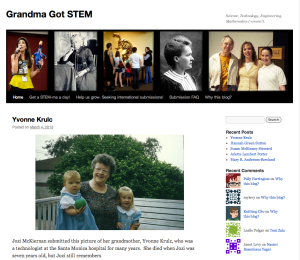Rachel Levy, Associate Professor of Mathematics at Harvey Mudd College, found herself tired of hearing people try to teach students to speak accessibly about science, technology, and math by suggesting they should “explain it as if you were talking to your grandmother.” While she knew that they likely meant “explain that in a compelling and clear way so that a person without a technical background could understand it,” she was concerned by the profiling (female + maternal + age) such statements enacted.
While it is true that many people in the world, some of them grandmothers, have not had access to STEM education due to cultural, economic, geographic, gender-bias or other reasons – the grandma profile does more harm than good. Levy believes, like many others, that it is time to transition away from describing an elementary idea as “so simple your grandmother could understand it.”
To address this issue, Levy has created a new blog called Grandma got STEM.  Initially, Levy began the blog in order to collect very basic profiles (pic, name, occupation) of grandmothers who had engaged with STEM in some way; she imagined that she might use that information to create a collage or other art project (which she still might do).
Initially, Levy began the blog in order to collect very basic profiles (pic, name, occupation) of grandmothers who had engaged with STEM in some way; she imagined that she might use that information to create a collage or other art project (which she still might do).
But as she began to get emails from contributors, the blog developed into a collection of more robust and personal narratives. “People began sending me stories” and “I thought, if people are going to come back to the blog more than once, it’s because they want to read those stories.” To this end, Levy is encouraging submissions that arise out of personal connections. “It’s the photo from the family album of women doing STEM or the memories of those experiences that readers find really compelling.” In addition to serving as a public forum to inspire, Levy hopes that the blog will eventually be used as a classroom resources for K-16.
In the first two weeks of existence, the blog had about 3000 views from 40 different countries, including Madagascar, Kenya, Trinidad and Tobago, Latvia, and Colombia. Levy says, “I really have no idea how people in so many far away places have found the blog. It makes me want to shout to them a welcoming “Hellloooooooo!” and “Who are you?” So far, most of the submissions have come from inside the US, although an early post was submitted from an Engineer in Turkey. Her hope is that the blog will receive submissions from all over the world.
Each day the blog features a picture and personal narrative about a grandmother in STEM, affectionately known as a STEM-ma. Posts have been contributed by sons and daughters, granddaughters and grandsons, the women themselves and their partners.
Levy was inspired to create the blog as a way of addressing the “so simple your grandma could understand it” problem on a larger scale after attending Science Online 2013, a conference about science communication. She features grandmother Karyn Traphagan, the Executive Director of Science Online, in an early post and on the site’s banner. For Levy, the blog “helps me think about a way to solve the problem in a way that celebrates these women rather than just complaining that they’ve been misrepresented.”
While the blog began as a project focused on the oft-referred-to grandma, it will not be limited exclusively to grandmothers. Levy has already heard from great aunts who would like to be included. She’s also heard from women in STEM who say they are longing to be grandmothers and certainly are old enough, but their own children have not yet had children. Other women have delayed or decided against child-rearing, making grandmotherhood less likely or impossible. Levy also notes that “some women did not have access to education. Some still do not. All of their stories are welcome. The experiences of all these women contribute to our impressions and attitudes about the relationship between gender+age+maternity and technical prowess.”
Readers can find the blog at ggstem.wordpress.com and they can follow on twitter @mathcirque and with the hashtag #ggstem. If you’re a grandmother interested in submitting your story, send an email to ggstem@hmc.edu with your name, a photo, and a remembrance about your experiences with/in STEM. Readers are also encouraged to submit stories about grandmothers they know – include her name, photo, your relationship to her, and a story about her experiences with/in STEM. The blog provides some examples of different lengths and styles of posts. Submissions go through a basic editing process and then authors are given an idea of when their posts will appear.
Levy is particularly eager to expand the range of experiences represented on the blog, she is hoping for a minimum of one post submitted from each country, and she encourages readers to spread word about this project as widely as possible. Additionally, if you have a global network (personal or professional) and are willing to help Levy spread the word, send an email to ggstem@hmc.edu.
— Jacque Wernimont